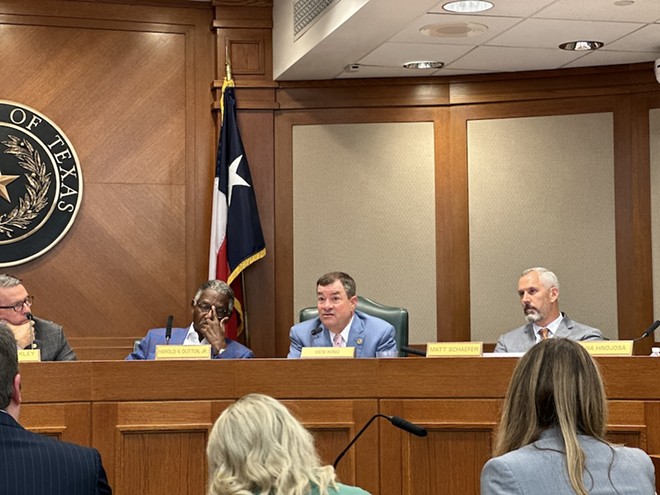
Michael Karlis
Texas state Rep. Ken King (second from right) expresses concerns that school vouchers won’t benefit rural students during Monday’s House Committee on Public Education hearing.
AUSTIN — Even though Republican Gov. Greg Abbott spent heavily to primary members of his own party who voted against school voucher legislation last session, rural Republicans on the House Committee on Public Education are still skeptical about how the plan benefits students outside urban areas.
Rural GOP lawmakers raised those concerns during the committee’s lengthy hearing Monday in Austin.
After Michael Chartier, policy director for pro-voucher group ExcelinEd, testified that private schools would pop up in sparsely populated areas if the Texas Legislature approves a voucher plan, committee member Texas Rep. Ken King of Canadian pushed back at the claim.
“I’m going to have an underfunded public school system, and then we’re going to take that money and give it to kids in urban settings,” said King, a Republican. “I’m all for those kids, but my kids are what’s important to House District 88.”
King was one of 21 House Republicans in the last legislative session who voted for an amendment stripping vouchers from House Bill 1, a massive education package. The failure of vouchers to pass the GOP-controlled Texas Legislature was a major embarrassment for Gov. Greg Abbott who spent months pushing lawmakers to pass a so-called school choice plan.
Abbott failed to sway enough rural Republicans, who have long questioned how a school voucher program would benefit kids in sparsely populated districts.
Families in sparsely populated counties don’t have access to private schools where they could spend their vouchers, those lawmakers maintain. Meanwhile, passage of a voucher program would mean less money for the struggling public schools serving rural communities, they argue.
Even so, Patrick Wolf, an education policy professor at the University of Arkansas, said in testimony that a study shows Florida’s voucher program led to more families relocating to rural areas.
“The public schools in rural counties in Florida have lost some market share to private schools, so they are educating a lower proportion of the K-12 students in their county,” Wolf said. “But, their enrollments are up because more families have moved to rural communities in Florida — and one reason they’ve moved there is because they know they have access to school choice.”
The Current was unable to independently verify Wolf’s claim.
ExcelinEd’s Chartier said parents in rural West Virginia used that state’s voucher program to start micro-schools and create home-schooling cohorts. He added that online private schools are also available to voucher recipients.
“I’ve seen them in buildings that were vacant,” Chartier said. “They come in and remodel buildings and were able to serve students in the classroom setting. There are former homes that they’ve parted out to be classrooms.”
Chartier didn’t specify whether the schools in formerly abandoned buildings are accredited.
Republican Rep. Matt Schaefer of Tyler, whose district includes a rural swath of East Texas, downplayed the idea that startup schools would materialize to serve sparsely populated areas across the Lone Star State.
“The idea that a brick-and-mortar private school is going to pop up in these communities is just not realistic,” he said.
Schaefer continued: “If you’re going to create a choice program, don’t make one that just primarily benefits urban areas of the state. All means all when it comes to these students, and I think y’all need to come up with a way to allow those public schools to help customize the education of the students they’re already serving.”
Schaefer — one of the most conservative members of the lower chamber — argued that instead of creating a separate, multi-billion-dollar school system, Texas should use its $33 billion budget surplus to fund programs badly needed by public schools.
Even though Schaefer expressed skepticism on vouchers during the hearing, he didn’t vote for the amendment removed them from HB 1. That means Abbott’s crusade against Republicans that defied him last legislative session may have missed a significant anti-voucher voice within the party’s ranks.
For what it’s worth, Schaefer has said he won’t run again following his current term.
“One thing is becoming clear in this school voucher hearing: Abbott’s whip count is off,” longtime state capitol journalist Scott Braddock of the Quorum Report tweeted as testimony played out.
The House Public Education Committee is set to resume hearings Tuesday.
Subscribe to SA Current newsletters.
Follow us: Apple News | Google News | NewsBreak | Reddit | Instagram | Facebook | Twitter| Or sign up for our RSS Feed